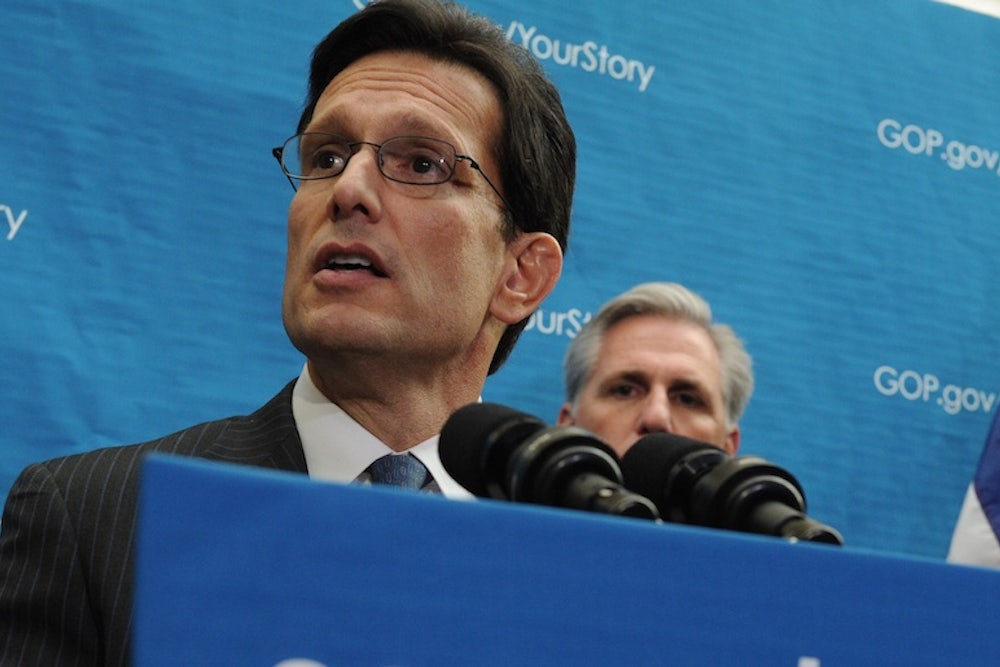All that fuss about people not paying their Obamacare premiums? It’s looking more and more like a non-story.
As the number of people signing up for private insurance through Affordable Care Act marketplaces climbed past 6, 7, and eventually 8 million people, Republicans and their allies said the numbers were wildly misleading because large numbers of those people wouldn’t make payments. In other words, they would remain uninsured. Last week, Republican staff from the Energy and Commerce Committee published a report, based on data they collected from insurers, showing that the payment rate was just 67 percent—a figure Republicans were quick to publicize. "According to data provided to the House Energy and Commerce Committee by insurers, only 67 percent of enrollees in ObamaCare’s federal marketplace had paid their premiums as of April 15," Eric Cantor, the House Majority Leader, said. "These numbers stand in stark contrast to the White House’s previous assertions. While the administration was eager to declare that ObamaCare’s mandate had worked, it has so far not provided any substantive data to back that up."
It's true that the Administration hadn't released such data. But it was also true that complete data wasn't yet available—as the House committee report made very clear. By the middle of April, when the Committee asked for the numbers, people who had signed up for coverage at the last minute had just gotten (or were about to get) their first payment notices. The deadline for making those payments was still two weeks away. "The survey was so incredibly rigged to produce this result, it was a joke," one insurance industry source told TPM’s Dylan Scott. "Everyone who saw it knew exactly what the goal was."
Insurers had already indicated publicly that payup rates were running higher—between 80 and 90 percent. On Wednesday, a handful of executives appeared formally before the committee and reported the very same thing.

You can see what’s really happening by looking at the graph above, which is based on monthly data that one carrier, Health Care Service Corporation, included in its written testimony. For policies that first became effective in January, February, and March, the payment rate was higher than 85 percent. It fell a bit for policies that became effective in April and then, for policies that became effective in May, it fell a lot—all the way to 68 percent. But that was to be expected, company officials said. “There are natural lags between the effective date of coverage and the date on which the member’s coverage may be due," Darren Rodgers, the chief marketing officer, wrote. "For instance, applicants with policies with an effective data of May 1 may still have time remaining in their payment schedule.”
It seems entirely possible that, when all is said and done, the payup rate for all plans will be closer to 80 than 90 percent—maybe a lot closer. Last-minute shoppers could also turn out to be the most delinquent payers, for example. But that'd still work out to roughly 6.5 million people getting insurance through the new marketplaces, which would be less than what the Congressional Budget Office originally predicted but more than CBO predicted following the technological problems of the Obamacare websites. “What you have here is very solid first year enrollment, no matter how you slice it,” Dan Mendelson, president of Avalere Health, told Bloomberg's Alex Wayne.
If an account of Wednesday's hearings by The Hill's Elise Viebeck is accurate—I didn't see them—the testimony from insurers didn't sit too well with members of the House majority. “Republicans were visibly exasperated,” Viebeck reported, “as insurers failed to confirm certain assumptions about Obamacare.” Republicans have had plenty of chances to embarrass Democrats over Obamcare and, given the law’s very real shortcomings, they’ll be sure to have plenty more. But on Wednesday, it seems, Republicans mostly succeeded in embarrassing themselves.
